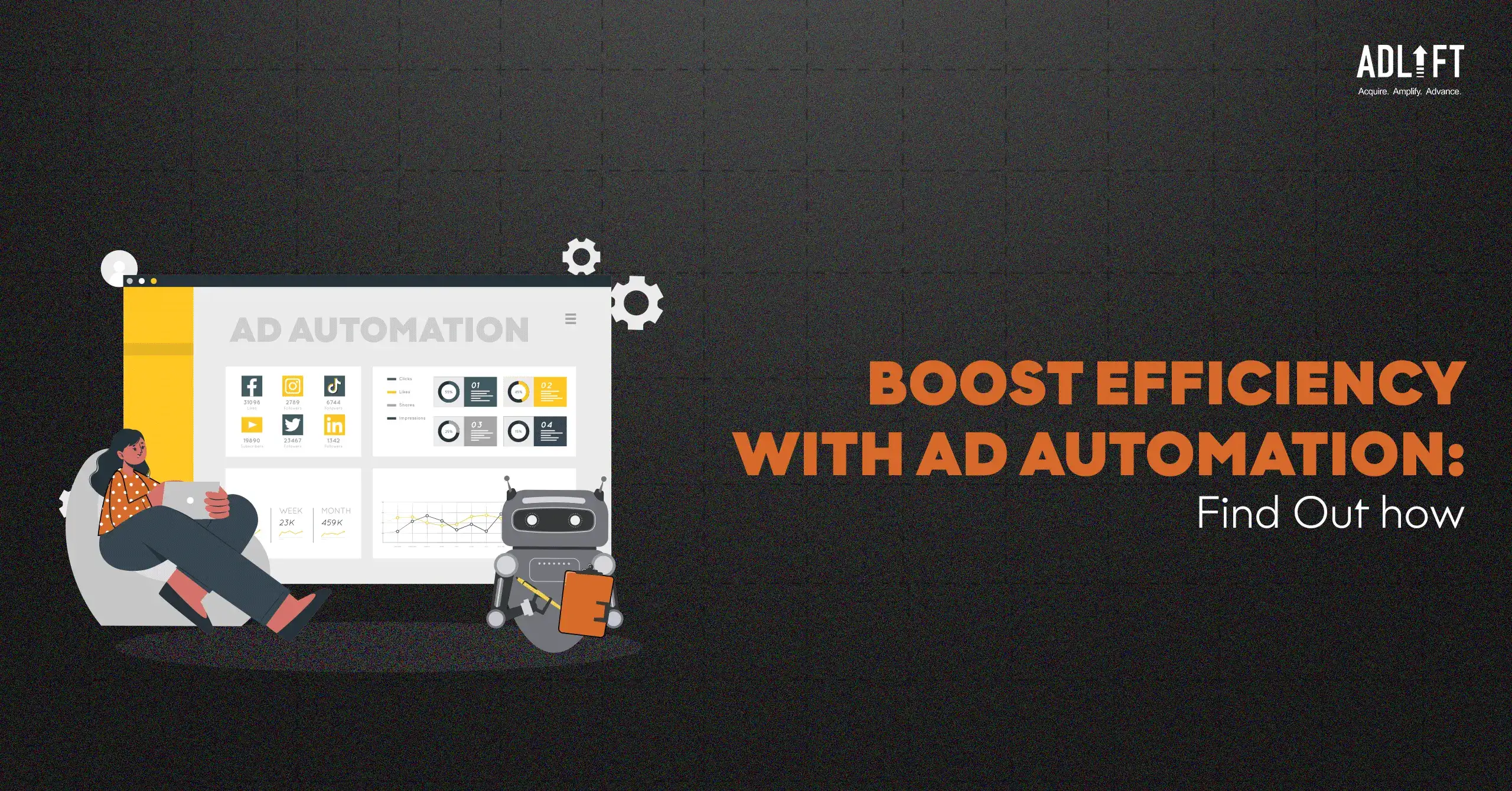Maximizing Efficiency with Ad Automation

Intensifying competition and the emergence of new brands have surged the demand for advertisements in the digital world. Global digital advertisement spending is expected to reach $455.30 billion in 2024, according to eMarketer, which reveals the growing dependence of marketing initiatives on online platforms. This is a testament that the importance of advertisements cannot be overstated, as they play a significant role in shaping consumer behavior and helping businesses reach their target audience while also driving growth.
However, ad campaign management can be laborious and time-intensive. The process requires constant attention to detail, from creating the ideal ad copy to strategizing the bids. That’s why this approach can become inefficient and cumbersome, leading to missed opportunities and bad campaign performance. However, the advertising industry shows clear signs of a major transition toward ad automation.
With today’s consumers needing quick, relevant, and tailored advertisements, ad automation becomes even more crucial. A survey by HubSpot even states that 74% of internet users become irritated with websites when they see advertisements irrelevant to their interests. This change emphasizes how companies must implement cutting-edge advertising tactics that use automation and data to successfully create personalized and customized ads. Additionally, integrating AI and ML in ad campaigns has become more common as it allows specific targeting, better performance, and real-time bidding. For instance, Google Ad’s automated bidding strategies have proven to raise conversion rates by 20% compared to manual bidding.
Get
in Touch
Contact AdLift for a 360-degree marketing plan
Understanding Ad Automation
Ad automation employs special software and technologies to optimize and manage various aspects of advertisements. This involves AI and machine learning to analyze data and make decisions while streamlining the advertisement process.
Businesses that use ad automation also gain from increased scalability. Handling campaigns manually gets harder as they become more complicated and widespread. Large-scale campaigns can be managed effectively across multiple platforms with automation, guaranteeing consistent messaging and performance. When various aspects of a PPC campaign are handled automatically, businesses can prioritize the strategic activities.
Additionally, its ability to blend ad automation solutions with other marketing technologies—like analytics platforms and customer relationship management (CRM) systems—offers a thorough understanding of marketing initiatives and their effects on corporate goals.
Elements that You can Automate
Running a PPC automation requires multiple components, and understanding each aspect is important to running successfully automated ads. These elements involve:
Bid Management
Managing bids manually requires more time. It also provides space for errors and inconsistencies. Imagine just how difficult it would be to manually monitor hundreds of keywords for numerous search ad campaigns, each with its own competition and success indicators. It would be an overwhelming task.
PPC automated bidding modifies your bids automatically based on real-time data. The algorithm may automatically raise your offer on holidays, for instance, if there is a surge in searches for your product during that period. This method removes the need for you to check and modify bids continuously. Some automated bidding tools include Optmyzr, Google Ads Smart Bidding, and Microsoft Ads Automated Bidding.
You may maximize your budget, lower the possibility of human mistakes, and ensure your advertising reaches the right audience at the right moment when they are most likely to interact by using automated bidding.
Creative Testing
Continuous testing of various variations of headlines, descriptions, and visuals allows the brands to figure out which combination of these sets appeals to their intended audience the most. But, performing this task manually can be time-consuming while also being susceptible to mistakes.
Automation ads simplify this process by streamlining creative testing, which identifies the best-performing ads by analyzing various ad combinations in real time. Some of the tools used during this process include – AdEspresso and Bing Ads Experiments.
Campaign Management
The campaign management process includes everything – planning, implementing, and monitoring your PPC campaigns. This is the component where you set bids, determine keywords, decide on creatives, and monitor results.
With automated PPC management systems, such as Google Ads Experiments, you improve the effectiveness of your PPC advertising. These systems enable you to automatically track the efficiency of campaigns in real-time and make modifications in accordance with predetermined standards.
Targeting the Audience
By optimizing machine learning, automated audience targeting modifies the audience groups that your advertising is aimed at. This ensures that the people most likely to interact with your ads will view them.
Suppose the analysis depicts that the older audience interacts more with your adverts. In this case, automation systems such as Google Audience Insights can reallocate a larger portion of your funds towards that age group. By automating this process, you continuously optimize, resulting in a higher return on investment.
Automated Reporting
Automated reporting simplifies the collection and presentation of data from the PPC campaigns. Moreover, frequent report generation saves time by eliminating the need for manual report creation.
With PPC report automation tools like Google Ads Reporting, you can obtain accurate and fast insights without the headache of manual reporting. This maintains the efficacy of your campaigns and enables you to act swiftly and decisively.
Explore Ad Automation with AdLift!
Impacts of Ad Automation Tools on the Conversion Rates
Businesses can automate repetitive tasks and optimize ad performance by leveraging ad automation. This ultimately leads to achieving better results.
Let’s take a detailed look at the impacts of ad automation on conversion rates.
Better ROI and Cost Efficiency
PPC automation tools continuously monitor your key performance indicators and adjust the bids in real-time. This reduces ad spend while assuring maximum visibility and engagement rates by prioritizing a better-performing advertisement.
Moreover, these tools can provide detailed insights, allowing marketers to make well-informed decisions for future campaigns.
Personalized Targeting
Ad automation’s role doesn’t end with streamlining various advertising tasks. It employs user data like demographics, behavior, and preferences to deliver more personalized ads that can resonate with individual users, hence increasing sales. Additionally, according to a study by Accenture, 91% of consumers are more likely to buy from brands that provide relevant offers and recommendations.
Better Reporting and Analytics
To monitor the impact and performance of the advertising campaigns, automation provides you with real-time data and analytics. This immediate access to performance metrics allows businesses to track their ads’ performance at any given moment rather than waiting for periodic reports. This constant flow of information enables businesses to quickly identify which components of their campaigns are working well and which are not. With all this data, businesses can highlight areas for improvement and adjust their strategies for better results.
Scalability and Efficiency
Businesses can scale their advertising through automation without adding additional manual labor. This is particularly useful for larger campaigns that need continuous monitoring and adjustments. Businesses can use automation to run several campaigns on various platforms simultaneously, maximizing conversions and guaranteeing constant performance.
Improved User Experience
Automation enhances the consumer experience through personalized interactions and advertisements. By setting up automated systems, businesses can ensure that customers receive immediate responses to their actions. These custom alerts and notifications play a major role in engaging customers as they make them feel valued and seen, reducing the chances of losing potential sales due to delayed responses.
Over time, this results in greater customer advocacy, where loyal customers become brand ambassadors who spread positive word and bring new customers.
What’s New in Ad Automation?
With the integration of automated technology in the advertising world, numerous trends have started surfacing. These advancements include:
Employment of AI
The introduction of artificial intelligence and ML has elevated personalization to a new level. Advertisers can create more relevant and successful ad campaigns because these technologies can accurately forecast customer behavior and preferences. This trend toward hyper-personalization transforms how businesses interact with consumers, improves engagement, and raises conversion rates.
The effectiveness of this approach is backed up by factual data—according to a report by Instapage, personalized calls to action (CTAs) convert 202% better than generic ones.
Keywords Match Types
Phrase and exact match are more precise than ever. That’s why you may appear in fewer searches. However, in 2024, this is going to change.
Google is broadening the definition of exact and phrase match keywords to include certain larger, relevant search terms. This implies that phrase and exact match targeting will remain precise but contain some larger but still highly relevant search phrases.
And you will still have more opportunities for your ads to appear for relevant keywords while maintaining match precision.
Video Marketing to be in the Mainstream
With an attention span of eight seconds and too much digital clutter, video marketing has become one of the top trends because of its visual appeal.
These advertising formats are perfect for capturing the fleeting attention spans of today’s consumers because they uniquely communicate complicated ideas more effectively. Videos, in contrast to text or photographs, combine sound and vision to create a multisensory experience that can trigger feelings and spur action. Because of its immersive quality, video material is more likely to be remembered and shared.
Reaching the Right People at the Right Time
Audiences have become one of the top priorities of PPC’s strategy. The arrival of automated targeting will help brands push their advertisements directly to their ideal consumer. Brands can reach their target consumers based on specifications such as age, gender, geographical location, and income.
Automated audience targeting has become one of the best options for 2024, as it allows you to reach a more specific audience than keyword targeting does. Although keywords remain an effective way to reach people who use those phrases, audience targeting still provides even more exact targeting.
Voice Search
Voice search is a advancing technology integrated into daily life to get quick answers and save time. PPC automation advertising tools such as Google Keyword Planner and Semrush are now leading this search.
These tools are capable of analyzing voice search queries in real time. These systems can interpret the complex details of spoken language, capturing the purpose of these queries while delivering the tailored ad content to the conversational tone used in voice searches.
Get started with AdLift for Better Ad Automation.
Ad automation is crucial for businesses looking for cutting-edge technology that enhances efficiency and improves ad performance. By tapping into this system’s power, brands can unveil the full potential of their digital advertising campaigns, leading to substantial improvements in performance and business growth.
Partnering with leading agencies like AdLift, which has helped many businesses improve their digital visibility through ad automation, lets you access expert consultation and advanced strategies designed specifically for you to elevate your advertising efforts and keep you ahead of the curve. Now is the perfect time to try ad automation and revolutionize your advertising approach. So, don’t let manual processes hold you back. Experience the benefits of automated advertising and see how it can transform your business. Get started with AdLift today and experience the benefits of automated advertising for yourself!
Sources:
Categories
Recent Posts
- How do I Verify My Business on Google to Ace Local SEO? March 17, 2025
- The Pros and Cons of Pay For Performance SEO March 17, 2025
- Website Structure for SEO: A Blueprint for Better Rankings March 17, 2025
- Is SEO for Subdomains Hurting your Rankings? Let’s Find Out! March 17, 2025
- Outsourcing SEO: A Cost-effective Solution for Startups to Scale Quickly March 17, 2025
- Keyword Cannibalization: Why It Matters for Your Company and How to Avoid It March 12, 2025
- The Role of SEO Projections in Budget Planning for CMOs March 11, 2025
- SEO for Bing: Unlocking Opportunities for Business Owners and Marketers March 11, 2025
- How to Maintain SEO and Rankings: Your SEO Maintenance Checklist March 7, 2025
- Must-have Enterprise SEO Tools to Boost your Online Presence March 7, 2025
Get
in Touch
Contact AdLift for a 360-degree marketing plan







